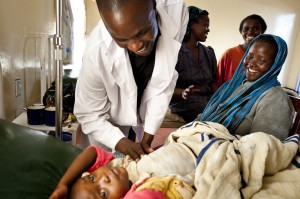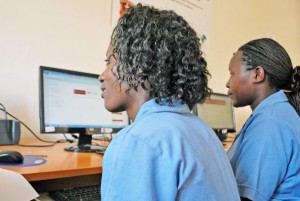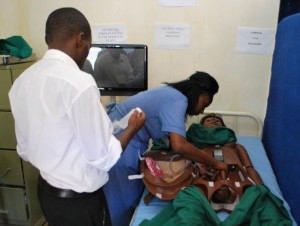
Performance Improvement/Optimizing Performance and Quality in Kenya
Where has OPQ been used?
- Multiple levels of the health and health training systems
Key lesson:
- Enhanced capacity of training institutions and regulatory bodies supports development of clinical competencies
IntraHealth is currently applying PI/OPQ (Performance Improvement/Optimizing Performance and Quality) methodology to two major projects in Kenya. The first is the Capacity Kenya project (2009–2014), which aims to strengthen health workforce policy and planning, build the knowledge and skills of health workers, and improve health worker productivity and retention. The second is the FUNZOKenya project (2012–2017), which supports Kenya’s efforts to transform its health worker education and training systems.
Capacity Kenya Project
In 2009 and 2010, as part of the Capacity Kenya project, IntraHealth partnered with USAID and other stakeholders to conduct a two-phase performance needs assessment of the Kenyan health training system. The initial phase assessed the competencies of health workers to deliver the Kenya Essential Package for Health (KEPH) at multiple levels of the health system, from community to provincial. The goal was to learn whether gaps existed that might be closed by a stronger health training system. The second phase identified specific capacities and gaps, including gaps in gender equality with respect to opportunity and access, pre-service training, in-service training, and continuing professional development systems responsible for training health care workers to deliver the KEPH.
Based on the 2010 findings of this performance needs assessment, stakeholders developed a package of recommendations. These included fuller integration of policies that promote equal opportunity for women, updated curricula, improved student supervision at clinical placement sites, improved assessment of the supervisory process, the establishment of a mechanism to improve system linkages, and an increase in technological and communication resources.
 The need for the latter recommendation, increased technological and communication resources for the health training system, had been apparent even from the beginning stages of the performance needs assessment. This key finding strengthened Capacity Kenya’s commitment to build the institutional capacity of the Kitui Kenya Medical Training College by creating the Kitui Center of Excellence for Family Planning and Reproductive Health (Kitui CoE). IntraHealth’s PI methodology was critical to this project. In late 2010, the IntraHealth team members co-facilitated a five-day workshop to equip management, faculty, and clinical preceptors with relevant PI and supervisory skills in reproductive health and family planning.
The need for the latter recommendation, increased technological and communication resources for the health training system, had been apparent even from the beginning stages of the performance needs assessment. This key finding strengthened Capacity Kenya’s commitment to build the institutional capacity of the Kitui Kenya Medical Training College by creating the Kitui Center of Excellence for Family Planning and Reproductive Health (Kitui CoE). IntraHealth’s PI methodology was critical to this project. In late 2010, the IntraHealth team members co-facilitated a five-day workshop to equip management, faculty, and clinical preceptors with relevant PI and supervisory skills in reproductive health and family planning.
 The Kitui CoE, which was launched in April of 2011, now serves both to support college faculty in the innovation of teaching methods for reproductive health and family planning and to provide this training to nursing and medical students. In this way, the center helps health workers to bridge the gap between theory and practice. The institutionalization of PI within the Kitui CoE will provide a model for scale-up of this training model to Kenya Medical Training College centers throughout the country, as well as the scale-up of reproductive health and family planning services in other East African countries.
The Kitui CoE, which was launched in April of 2011, now serves both to support college faculty in the innovation of teaching methods for reproductive health and family planning and to provide this training to nursing and medical students. In this way, the center helps health workers to bridge the gap between theory and practice. The institutionalization of PI within the Kitui CoE will provide a model for scale-up of this training model to Kenya Medical Training College centers throughout the country, as well as the scale-up of reproductive health and family planning services in other East African countries.
FUNZOKenya Project
The findings of the performance needs assessment not only spurred the development of the Kitui CoE, but also shaped the design of IntraHealth’s most recent project, FUNZOKenya. The primary goals of FUNZOKenya are to strengthen pre-service education of health workers, improve access to training for existing health workers, and link professional licensure to ongoing professional development.
The project has used OPQ to support regulatory bodies and training institutions: In December 2012, IntraHealth facilitated an OPQ workshop for forty representatives from the Ministries of Health, health regulatory bodies, and training institutions.
- The Medical Practitioners and Dentists Board created an action plan for disseminating OPQ throughout the organization and for reviewing both its core curriculum and its continuing professional development guidelines for doctors and dentists. The results of these efforts included a new emphasis on medical ethics and patients’ rights in the curriculum and an updated plan to ensure that continuing professional development supports key clinical competencies. The Kenya Nutritionists and Dieticians Institute prepared an action plan that addressed the need for development of a database of nutrition and dietetics students, training standards in the discipline, and continuing professional development guidelines for clinicians. After the creation of these tools, the organization was able to use them to inspect and accredit training institutions.
- Participating training institutions used OPQ as a mechanism for self-evaluation, and also developed individual actions plans. One of these institutions, Moi University College of Health Sciences, took its investment a step further and assumed leadership of the nation-wide FUNZOKenya post-training assessment. The resulting report was disseminated in January 2014. Future goals for OPQ within FUNZOKenya include strengthening institutional commitment and foregrounding institutional priorities, as well as integrating this methodology into post-training follow up activities.
As part of the training systems strengthening strategy of FUNZOKenya, the project has used OPQ through multiple sub-strategies. The use of the Health Professionals Management Tool, also referred to as Bottlenecks and Best Buys, is the entry point for engaging with training institutions. It identifies gaps in performance and quality in nine thematic areas of the educational system. As a next step, institutions use the findings during a feedback meeting to identify potential root causes where appropriate, and then design targeted interventions, which are implemented with technical support and capacity building. The institutions and their stakeholders take incremental leadership of the process and the change in performance is monitored and evaluated.
In strengthening curriculum governance, FUNZOKenya, with technical assistance from the University of Nairobi, has supported the adaptation of a harmonized curriculum development and review framework, which borrows its design from OPQ. Within the training institution systems strengthening strategy, a second framework that borrows from OPQ is the clinical placement model. These two frameworks are annexed for reference.
Read more:
- Technical Brief | Performance Needs Assessment
- Technical Brief | Kitui Center of Excellence for Family Planning and Reproductive Health
